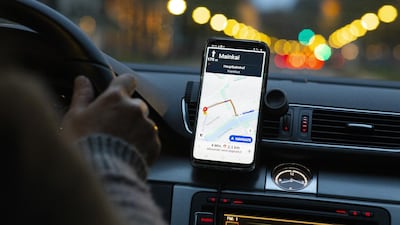Four UK Uber drivers have launched legal action against the private hire company over the secret data it allegedly keeps on them.
The drivers have requested that Uber provides them with their personal data amid fears they are being secretly labelled and categorised by the business, affecting which jobs they are given.
On Monday lawyer Anton Ekker lodged their application at a court in Amsterdam, where Uber’s parent company, Uber BV, is located.
“With Uber BV based in the Netherlands as operator of the Uber platform, the Dutch courts now have an important role to play in ensuring Uber’s compliance with the General Data Protection Regulation (GDPR),” Mr Ekker said.
“This is a landmark case in the gig economy with workers asserting their digital rights for the purposes of advancing their worker rights.”
Mr Ekker told The National that the next stage in the process will now be for the court to set a date for a full hearing.
“The data-processing by Uber has a major impact on applicants,” Mr Ekker said.
“After all, this data-processing provides Uber with a very penetrating picture of, among other things, the use of the Uber Driver App, the location and driving behaviour of the driver and communication with customers.
“It has proved to be very difficult for drivers to gain full access to their personal data. Uber offers drivers the opportunity to request access to their personal data via its website or the Uber Driver App. However, the scope of the inspection option is limited.
“Uber's response to access requests is not consistent. Drivers usually receive only incomplete information. Often it only concerns a very limited part of the categories of personal data that Uber processes and the access granted is limited to a period of several months.”
The drivers are being represented by the App Drivers & Couriers Union (ADCU).
“Drivers must have full transparency over algorithmic management and complete access to their data so they can build real collective bargaining power in their union,” said Azeem Hanif, chairman of ADCU in Nottingham.
“Once again Uber is flouting the law and exploiting low-paid workers.”
The ADCU claims that Uber has violated its obligations under the GDPR by failing to provide full access to their personal data.
It also alleges that Uber has failed to provide sufficient information on the automated decision-making and profiling that takes places in the Uber Driver App and other systems used by Uber.
“It runs contrary to Uber’s insistence in many employment misclassification legal challenges across multiple jurisdictions worldwide that drivers are self-employed and not subject to management control,” the ADCU said.
The union says multiple drivers have been given access to little or no data despite making a comprehensive request and providing clear detail on the data requested.
It claims that Uber drivers are subject to performance monitoring at work and alleges Uber has attached performance-related electronic tags to driver profiles with categories including late arrival, attitude and inappropriate behaviour.
“Uber has deliberately blocked the efforts of drivers to access their data for the purposes of establishing a data trust,” James Farrar, director of Worker Info Exchange, said.
“This is not only a violation of the law but a terrible abuse of Uber’s position of informational power over drivers. Drivers suffer not only wage theft but data theft, too.”
The legal action comes one day before Uber will appear in the UK's Supreme Court to challenge a previous ruling in favour of the ADCU over driver worker rights.
The UK’s Employment Tribunal had previously ruled that Uber drivers are workers under the law rather than self-employed contractors and are entitled to earn the minimum wage, to have paid holidays and should be given whistle-blower protection.
Its decision has been up held by the Employment Appeal Tribunal and the UK Court of Appeal. This is now Uber’s final roll of the dice to appeal the decision.
“Our privacy team works hard to provide any requested personal data that individuals are entitled to,” Uber said.
“We will give explanations when we cannot provide certain data, such as when it doesn’t exist or disclosing it would infringe on the rights of another person under GDPR.
“Under the law, individuals have the right to escalate their concerns by contacting Uber’s data protection officer or their national data protection authority for additional review.”
Uber operates in 67 countries and has more than 100,000 drivers in the UK.


